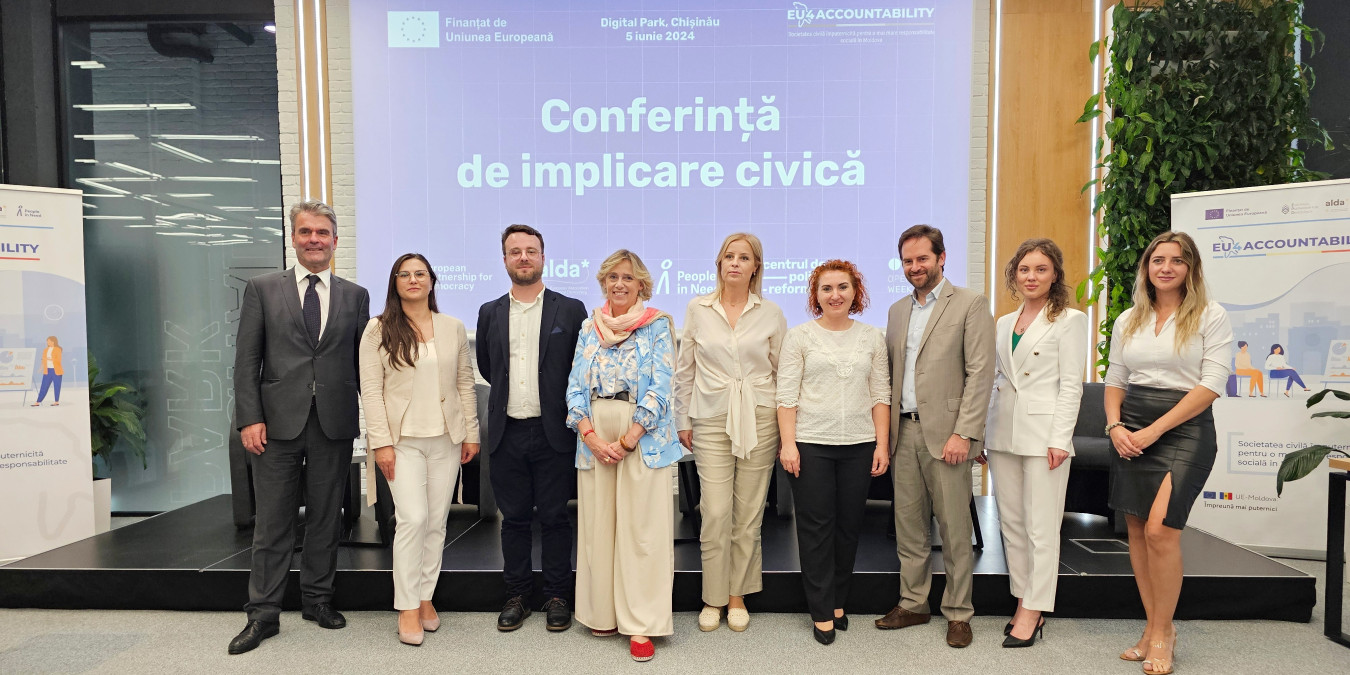EU4Accountability: В Кишинёве прошла первая конференция по гражданской вовлеченности
Опубликовано: 10 июн. 2024 г. Время для прочтения: 3 минуты Sdílet: Sdílet článek
First edition of the Civic Engagement Conference serves as a platform for multi stakeholder coordination on public participation and implementation of the Law on Access to Information of Public Interest
The inaugural Civic Engagement Conference took place in Chisinau, marking a significant milestone in Moldova's efforts to strengthen civic participation and accountability through the EU accession journey. The event, hosted by the EU4Accountability project, funded by the European Union, addressed the challenges of civic engagement and the role of citizens participation in decision-making processes at national and local levels.
The Conference brought together representatives from public authorities, civil society organisations (CSOs), and civic initiatives to reflect on joint strategies to improve active citizens participation throughout the policy cycle. Participants engaged in discussions about public participation tools, collaboration mechanisms between authorities and civil society, and the impact of national transparency policies on local governance.
The conference featured two pivotal panel discussions. The first focused on the implementation of access to information laws and included contributions from Her Excellence Ana Calinici, Secretary of State of the State Chancellery; MP Olesea Stamate; Mr Ion Bocan from the National Institute of Justice; and Nicolae Panfil from Promo-Lex. The second panel sought to address current challenges in decision-making, identify priority actions, and establish cooperation strategies between authorities and CSOs - featuring inputs from key actors from the Government, local authorities and civil society representatives. Key discussion points included the difficult access of local NGOs to national decision-making processes, lack of representativity, an outdated transparency law, and the obstacles that hinders the effectiveness of new cooperation platforms.
Speakers addressed key challenges in Moldova's decision-making processes. Participants highlighted obstacles such as scarce resources, a lack of direct communication with policymakers, and insufficient recognition of their role, hampering their ability to influence policies that affect their communities. Another critical point discussed was the lack of representation in decision-making bodies. Panelists emphasized the mismatch between governing institutions and the diverse population, leading to decisions that neglect the needs of marginalized groups and smaller communities, amplifying their voices in governance discussions.
Moreover, participants scrutinized the effectiveness of new cooperation platforms between civil society and institutions. While acknowledging the establishment of several dialogue and cooperation platforms, attendees expressed concerns about their efficacy in addressing the fundamental issues of participatory governance. There was a consensus on the imperative for these platforms to become more inclusive, dynamic, and responsive to ensure meaningful civic engagement.
Moreover, CPR Moldova unveiled the process coordinated with the Open Government Platform of the Republic of Moldova and the State Chancellery, aiming at establishing a monitoring mechanism of the Law on Access to Information of Public Interest.
The Civic Engagement Conference also shed light on the best practices drawing from the EU4Accountability project, which supported capacity development of local authorities and CSOs staff across the Republic of Moldova, empowering 59 CSOs to conduct small scale projects in the field of civic engagement, participatory budgeting and policy making.
EU4Accountability is funded by the European Union, aims to enhance the social accountability of public authorities in Moldova by empowering local CSOs to participate in monitoring and advocacy efforts. It is implemented by a Consortium comprising the European Association for Local Democracy (ALDA), the European Partnership for Democracy (EPD), and Czech organisation People in Need. The event was organised in cooperation with the think tank Center for Policies and Reforms (CPR Moldova).



